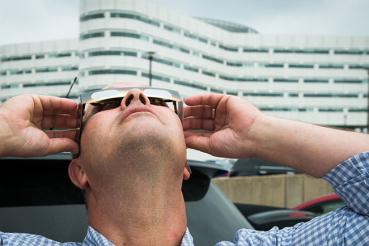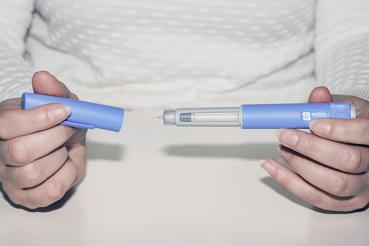Find out if your mom's ideas about health really ring true
As a young child, you rarely questioned your mom's wisdom. When you asked why, she always had the answer, and you accepted what she said as fact.
But as you grew up, you may have started to wonder about some of the things she told you. If you cross your eyes, will they actually freeze that way? Does coffee really stunt your growth? Will going out in the winter with wet hair make you catch a cold?
Rupel Dedhia, MD, a primary care physician at Rush, puts 6 common health tips from "Dr. Moms" to the test.
1. Mom says: Reading in dim light ruins your eyes ...
Science says: Remember your mom telling you that reading with a flashlight to finish your favorite book long after bedtime would ruin your eyes? It turns out mom was probably just trying to get you to go to sleep.
"Vision problems are usually caused by something genetic or heredity, not poor lighting," says Dedhia.
In fact, a study published in the British Medical Journal found that reading in low light does not damage eyes. But it can cause eye strain, which — while posing no long-term threat to vision — is quite uncomfortable.
Poor lighting makes your eyes work harder, which can make it more difficult for your eyes to focus. This can temporarily lead to dry eyes from blinking less; blurred vision; and head, back and neck aches.
While it is certainly more comfortable to read in a well-lit area, it is not absolutely necessary for powerful peepers.
... and so does staring at screens
Science says: While reading a book in dim light is harmless, reading on a device may not be. There's concern — though at this point, it's not scientifically proven — among vision specialists that the HEV light (also called blue light) produced by phone and tablet screens may cause permanent harm to the human eye.
And there is evidence that reading on devices for prolonged periods can cause what's called digital eye strain.
What is digital eye strain? According to the Vision Council, it's a collection of symptoms (eye strain, dry eyes, headaches, blurred vision, and neck and shoulder pain) that people may experience after using screens for longer than two hours at a time.
The council says more than 60 percent of Americans report experiencing these symptoms.
While there isn't definitive research showing that staring at screens causes permanent eye damage, or that digital eye strain can lead to more serious issues, it's a good idea to take steps to protect your eyes. Here's what the Vision Council recommends:
- Purchase eyewear with specialized lenses that feature digital eye strain-reducing capabilities.
- Take frequent breaks from your computer at work (which is also good for your overall well-being; try stretching, taking a walk or enjoying a healthy snack).
- Reduce overhead light to eliminate screen glare.
- Position yourself at arm's distance from the screen (the correct viewing distance for computers).
- Boost the text size so you don't have to strain to see clearly.
And Dedhia recommends setting limits for daily screen time, especially for kids. "If kids do their homework on a tablet or computer, factor that into their daily totals," she says.
3. Mom says: Sugar makes kids hyper
Science says: Much to the dismay of any parent who has blamed a giant cupcake for their child bouncing off the walls, research has found that sugar does not make children hyper.
A review of 23 different studies on the subject in the Journal of the American Medical Association found that sugar consumption alone does not cause hyperactivity in children.
Kids typically eat the most sugar on special occasions, such as parties, Halloween and large family gatherings — times when they are more stimulated than a typical day.
Thus, the situation and environment, rather than the cookies and candies, could be the real reason for post-party wildness.
Of course, limiting sugar consumption is still a good idea. Sugar has been linked to a host of health problems in kids, such as childhood obesity and diabetes. A study published in Pediatrics found that children who drank more than one serving per day of a sugary drink were 26 percent more likely to be obese.
4. Mom says: An apple a day keeps the doctor away
Science says: Give Mom credit for this one. Tasty, portable and nutritious, apples may actually be the perfect fruit.
A study from the Ohio State University's Ohio Agricultural Research and Development Center found that eating one apple a day for four weeks significantly lowered oxidized low-density lipoprotein (LDL), or bad cholesterol, which has been linked with atherosclerosis, hardening of the arteries that can lead to heart disease.
Researchers credit the might of the apple to its powerful antioxidant properties. Antioxidants have been found to reduce inflammation, promote healthy arteries and help fight aging by preventing and repairing cellular damage.
Of course, it takes more than apples to achieve long-term wellness, and thus, keep the doctor away.
"A diet high in fiber, found in fresh fruits and vegetables, can help prevent the development of chronic illness," says Dedhia. "However, it is also important to monitor your blood pressure, weight, cholesterol and blood sugar. That will help determine if your current diet is promoting or hindering your health."
5. Mom says: Drink cranberry juice for a bladder infection
Science says: Studies have found that reaching for a glass of cranberry juice to prevent or cure a urinary tract infection (UTI) is rather fruitless.
"Some studies show that consuming cranberries can prevent UTIs, but they don't prove it very strongly. And the amount you would have to consume is more than you can generally get in a bottle of juice," says Dedhia. "Cranberry juice also has a lot of sugar, which can actually worsen an infection — not to mention contribute to weight gain and other health issues related to having too much sugar in your diet."
Still looking for a weapon against bladder infections? Turn on the faucet.
"Hydration is the key," says Dedhia. "Instead of cranberry juice, I tell my patients to drink one or two liters of water a day, if they can tolerate that much. That helps flush out some bacteria."
Much to the dismay of any parent who has blamed a giant cupcake for their child bouncing off the walls, research has found that sugar does not make children hyper.
6. Mom says: Going outside with wet hair in winter will make you sick
Science says: A survey in Pediatrics found that 40 percent of mothers believed that sending their kids out in cold weather with a wet head would get them sick. Yet, science and medicine say otherwise.
"Going out with wet hair will not make you sick," says Dedhia. "A cold is usually caused by a virus, especially in the wintertime. Viruses are transmitted through the air or through contact with someone who has a cold."
However, catching a cold or flu is more likely in winter months. "Viruses like cold air; the flu is more resilient in cold air," says Dedhia. "The humidity in the summer can kill off some viruses, so that is why we see more cold viruses in the winter."
While putting a hat on your wet head will certainly keep you warmer, there are more effective ways to protect yourself during cold and flu season. Wash your hands frequently with warm water and soap, and avoid touching your eyes, nose or mouth.
7. Mom says: It takes seven years to digest swallowed gum
Science says: "Once it gets to your stomach, anything consumed within the body will generally take a half hour to two-and-a-half hours to process through the intestinal tract," says Dedhia. "There is no chance that gum remains in your system for seven years."
But because gum cannot be entirely broken down by digestion, different gastrointestinal conditions could cause issues for gum swallowers.
"People who have certain conditions that cause stalled digestion, where food builds up in the stomach, could have problems if the gum attaches to some of the other substances in their stomach," says Dedhia. "It is not an issue for most people, though."
Still, Dedhia advises against swallowing gum. "It is not so much a problem for digestion, but it could be a choking hazard, especially for children," she says.




